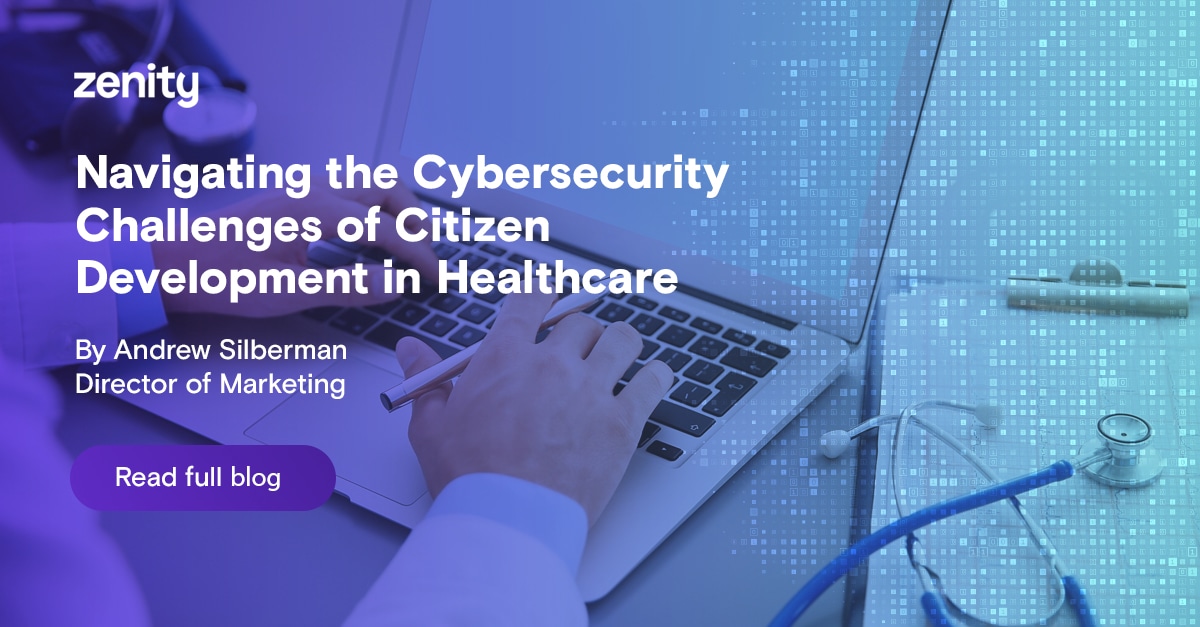Navigating the Cybersecurity Challenges of Citizen Development in Healthcare

Introduction
In an era of rapid technological advancements, healthcare organizations are always looking for ways to become more productive and more efficient. In this quest, they are increasingly turning to citizen development and Generative AI tools to streamline processes and drive innovation. Citizen development empowers non-technical employees to create their own applications and automations, thereby enhancing operational efficiency.
Citizen Development in Action
In talking to customers and partners we have seen a huge variety of really interesting use cases for citizen development within healthcare organizations. A couple of interesting and useful examples are apps being built for:
Patient Engagement and Communication: Citizen developers are creating custom patient engagement solutions to help communicate and help their patients faster and more effectively. For instance, non-technical staff, such as nurses or patient coordinators, can develop mobile apps or chatbots that help patients schedule appointments, receive medication reminders, access educational materials, or even provide virtual consultations. These tools can enhance patient experience, streamline communication, and improve overall patient outcomes.
Administrative Process Automation: Healthcare organizations and insurance companies often deal with complex administrative processes related to billing, insurance claims, and patient records. To combat these lengthy (and error-prone processes), non-technical staff can leverage citizen development platforms to create custom workflow automation solutions. These tools can automate routine administrative tasks, reducing manual errors, improving efficiency, and ensuring compliance with healthcare regulations. For instance, a front-desk receptionist might create a simple app to streamline appointment scheduling or insurance verification processes.
However, while the potential benefits are undeniable, healthcare organizations must also confront significant cybersecurity considerations, especially in the context of HIPAA compliance, data security, and business continuity. In this article, we will delve into these critical aspects and explore the key things to consider for healthcare organizations as they open up citizen development from a cybersecurity perspective.
Business Innovation
Citizen development can significantly enhance business innovation in healthcare organizations by enabling non-technical employees to address specific operational challenges. To maximize the benefits while maintaining security:
- Training and Support: Offer comprehensive training and support for citizen developers to ensure they can create secure and efficient solutions. This will help unleash the full potential of their creativity.
- Collaboration: Encourage collaboration between IT professionals and citizen developers. IT can provide guidance on security best practices while citizen developers bring unique insights into process improvement.
- Governance: Establish a governance framework that defines the boundaries and expectations for citizen development. This framework should include security standards and compliance requirements.
HIPAA Compliance Risks
Healthcare organizations operate in a highly regulated environment, with HIPAA setting stringent standards for the protection of patient data. As citizen development proliferates, and apps are created faster and in greater volumes than ever before, the risk of falling out of compliance increases dramatically. Here are some important considerations:
- Data Privacy: Citizen developers may inadvertently expose patient data when building apps or automations. Healthcare organizations must establish clear guidelines and safeguards to ensure that sensitive information remains protected.
- Black Box: With Generative AI now able to build applications by simply interpreting a document or processing a text prompt, healthcare organizations need to stay on top of things without scanning source code (or a traditional software development lifecycle).
- Audit Proof: With citizen developers now able to create apps and automations in record time, security leaders need ways to easily assemble lists and proof of which applications and automations are interacting with sensitive data, how it’s processed, stored, and more.
Business Continuity
When citizen developers create applications and automations, there’s a risk that they may leave the organization, potentially leaving behind a knowledge gap. To mitigate business continuity issues:
- Documentation: Require comprehensive documentation for all citizen-developed applications and automations. This should include business-level logic, who created what, who owns it, when it was last modified, and specific policies to accomodate changes in employment.
- Knowledge Transfer: Promote knowledge transfer from departing employees to their successors. Encourage the sharing of expertise and documentation.
- Review and Maintenance: Regularly review and update citizen-developed applications to ensure they remain functional and compliant. This should be part of a broader IT governance strategy and include things like identify when apps are used, how they are used, and for what purposes.
Conclusion
Citizen development can be a valuable tool for healthcare organizations seeking to improve efficiency, drive innovation, and enhance patient care. However, these benefits must be balanced with careful consideration of cybersecurity risks and compliance with regulations such as HIPAA and GDPR. By focusing on data security, visibility, business innovation, and business continuity, healthcare organizations can unlock the full potential of citizen development while safeguarding patient data and their operational integrity. In an ever-evolving landscape, staying vigilant and proactive in addressing cybersecurity concerns is essential to success in healthcare citizen development.
At Zenity, we’re here to help! Get in touch with us to see how we help healthcare organizations secure their most critical data, empower their staff, and get more done.



